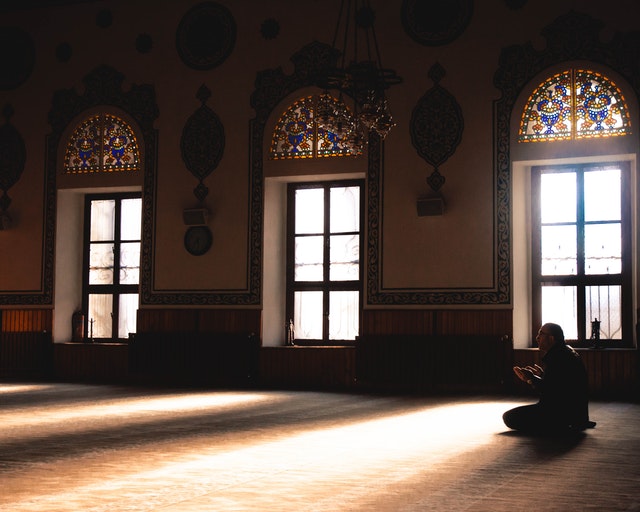Ka’b Ibn Malik (RA) hailed from the tribe of Khazraj in Madinah and was a renowned poet during his time, just as was his father. Ka’b Ibn Malik (RA) was a revered companion of the Messenger of Allah (PBUH) and was among the first few from the Ansar to pledge allegiance to Prophet Muhammad (PBUH) (at Al-Aqaba) and Islam before the Hijrah. His courage and love for the Prophet (PBUH) was such that he suffered eleven attacks from the enemy army by deliberately opting to don the Prophet’s (PBUH) battle armor. The stories of this noble companion are plenty, but one particular narration takes precedence above the rest in its insightful lessons for Muslims of all generations.
Preparations were being made for the battle of Tabuk. The believers were to travel a great distance to face a large army in scorching weather— it was a challenging time indeed. Unlike previous battles, the Prophet (PBUH) informed his followers of their destination and the many challenges that were awaiting them so that they may prepare ahead for the journey appropriately. It was mandatory for all the believers to join unless they had a legitimate reason. They were scheduled to leave their homes just in time of harvest. The hypocrites who could not resist the temptations of the cool weather and sweet fruit concocted various excuses to remain behind in their homes. Leaving the judgment of their true intentions to Allah, the Prophet (PBUH) accepted their excuses to remain behind.
But Ka’b Ibn Malik (RA) was not a hypocrite and was in fact a young, strong, and healthy individual who possessed the wealth and equipment at the time to undertake the journey successfully. His flaw however was procrastination. While the Muslims prepared in haste for their departure, Ka’b (RA) also joined in, but always returned home having accomplished nothing for the day and reassured himself that he had plenty of time to prepare for the journey. Eventually, the Prophet (PBUH) and his followers departed for battle while Ka’b Ibn Malik (RA) remained home. He kept telling himself he would prepare and re-join the army after they left, and since he was a lone rider, he believed he would be able to catch up with the army. He made several more unsuccessful attempts until it was too late and the army was out of reach. To his dismay, Ka’b (RA) soon realised that the only other men who remained behind with him were those who were incapacitated, old, and ones assumed to be hypocrites.
The Prophet of Allah (PBUH) realised Ka’b Ibn Malik’s (RA) absence upon reaching Tabuk. When he (PBUH) inquired about his whereabouts, an individual from the clan of Banu’ Salama (Ka’b Ibn Malik’s own clan) stated: “Allah’s Messenger, the (beauty) of his cloak and his appreciation of his sides have allured him and he was thus detained.” (which, culturally speaking was a very humiliating insult). Mu’adh bin Jabal (RA) immediately defended Ka’b (RA) replying: “Woe be upon that what you contend. Allah’s Messenger, by Allah, we know nothing about him but good,” at which the Prophet remained quiet.
When K’ab (RA) heard of the impending return of the Prophet (PBUH), he panicked and decided to make up an excuse for his absence at the battle of Tabuk. Being as eloquent as he was, he was confident in his ability to convince anyone. However, when the day of arrival drew closer, he decided against lying fearing the wrath of Allah. He knew Allah would expose any lies to His Messenger (PBUH). He decided to remain honest.
On the day of his return to Madinah, the Prophet (PBUH) offered prayers at the mosque and settled himself among his people, as was his tradition. A total of eighty people who remained in Madinah came forward to present their excuses to their Prophet (PBUH), who accepted them and invoked the forgiveness of Allah upon them.

Ka’b Ibn Malik’s (RA) turn came, and he sat before Allah’s Apostle (PBUH). He began by greeting the Prophet (PBUH) who returned the greeting with a smile that was marred with a hint of disappointment. When RasulUllah (PBUH) asked why he hadn’t joined, Ka’b (RA) replied: “Allah’s Messenger, by Allah, if I were to sit in the presence of anybody else from amongst the worldly people I would have definitely saved myself from his anger on one pretext (or the other) and I have also the knack to fall into argumentation. But, by Allah, I am fully aware of the fact that if I were to put forward before you a false excuse to please you, Allah would definitely provoke your wrath upon me, and if I speak the truth you may be annoyed with me, but I hope that Allah would make its end well and, by Allah, there is no valid excuse for me. By Allah, I never possessed so good means, and I never had such favourable conditions for me as I had when I stayed behind you.” Then Allah’s Apostle (PBUH) said, “As regards this man, he has surely spoken the truth. So get up until Allah decides your case.”
He was followed and reproached by some men from his tribe of Banu’ Salama for failing to present an excuse to such a degree that Ka’b (RA) considered returning to the Prophet (PBUH) and fabricating an excuse. Restraining himself with the utmost difficulty, he enquired the men if there were any others who had fallen into the same predicament as he, to which he learned that two other pious men were in a similar situation (Murara bin Ar-Rabi Al-Amri and Hilal bin Umaiya Al-Waqifi – RA). But since these two men were pious believers who had taken part in the Battle of Badr, Ka’b Ibn Malik (RA) decided to align himself with them because of their honesty. He decided not to make an excuse and accept his fate.
Muslims were forbidden from speaking to these three men who awaited Allah’s judgment. While the other two men remained home and wept, Ka’b (RA) continued to frequent the market and mosque. Although he made several attempts to speak to the Prophet (PBUH), those dear to him, and fellow Muslims, he was ignored. He mentioned “I would come to Allah’s Apostle and greet him while he was sitting In his gathering after the prayer, and I would wonder whether the Prophet did move his lips in return to my greetings or not.” He also mentioned that he would pray near RasulUllah (PBUH) and steal glances at him – when Ka’b would be busy in prayer, Allah’s Messenger would look at him, but when we would look at Allah’s Messenger, he (PBUH) would look away.
He felt greatly melancholic and remorseful because of this, to the point where as he said “till the very land (where I lived) appeared strange to me as if I did not know it”. During this challenging time, he received invitations from the king of Ghassan to abandon his religion and joined them, his belief in Allah never faltered and he became resolute in earning His forgiveness. He burned the letter from the king of Ghassan.
Forty days later, Ka’b Ibn Malik (RA) and the two men receive yet another directive from the Prophet (PBUH) to maintain distance from their wives. Eager to please Allah and His Messenger, Ka’b (RA) sent his spouse to her parents’ dwelling until he received the fateful verdict.
At dawn on the fiftieth day, heavily burdened by his predicament, Ka’b (RA) sat atop a roof to offer his Fajr prayer when he heard a voice in the distance: “O’ Ka’b Ibn Malik, there is glad tidings for you”. The Prophet (PBUH) had revealed to the congregation during Fajr prayers that Allah had decided to forgive the three men. Relieved, Ka’b (RA) fell in prostration. People flocked to congratulate the three men. Overjoyed by this, Ka’b Ibn Malik (RA) took off his garments and clothed a well-wisher with it. Owning no other garments to his name, he then borrowed some clothing and set off to visit the Prophet of Allah (PBUH) at the mosque. The Prophet (PBUH), whose face with bright with joy, received K’ab (RA) and congratulated him saying: “Be happy with the best day that you have got ever since your mother delivered you.” Ka’b Ibn Malik (RA) then asked the Prophet (PBUH): “Is this forgiveness from you or from Allah?” to which the Prophet (PBUH) replied: “No, it is from Allah”. Pleased, Ka’b Ibn Malik (RA) vowed to speak nothing but the truth until his last breath.
The full story as narrated by Ka’b Ibn Malik (RA) himself is mentioned in this hadith [Sahih Muslim Book 50, Hadith 62]
Important lessons that can be derived from the story of Ka’b Ibn Malik (RA)
The dangers of procrastination
It is well-known that Ka’b Ibn Malik (RA) was a person many held in high esteem. He was one of the earliest converts of Al-Ansar. He was well aware that not participating in the battle of Tabuk without a valid excuse was a great sin. He was physically fit and had no difficulty undertaking the journey, but his only vice was procrastination and trivializing the task at hand. It is immensely clear from this story that procrastination is a disastrous quality that can hinder a Muslim from righteous deeds. Henceforth, every time we delay a task, let us reflect on the story of Ka’b Ibn Malik—certainly, the fifty days of regret is not worth the fleeting joy of procrastination.
Being honest even when it is sure to get you in trouble
Ka’b Ibn Malik (RA) was preparing false excuses to save himself from the wrath of the Prophet (PBUH). But when he did face the Prophet (PBUH), his conscience was overcome with guilt and fear over the knowledge that even if the Prophet (PBUH) accepted his paltry excuse, Allah knew the truth and he would eventually face an even greater reprimand for his sin. Although he faced fifty challenging days, he was eventually pardoned for his honesty by none other than Allah—what an honor!
Further, in his pledge to remain honest until the end of his days, Ka’b Ibn Malik (RA) was also completely honest in his narration of this story to his son. He made certain to discuss his prior accomplishments laying special emphasis on the fact that not even the pious among the companions of the Prophet (PBUH) were free from the whispers of Satan.
Allah forgives one who sincerely repents
Although the conditions of his boycott were overwhelming, Ka’b Ibn Malik (RA) was firm in his repentance. His remorse was clear but he felt that if this was what he had to endure for his grave sin, then he would bear it—and that is the mark of one who sincerely repents. His regret was also evident in his old age through the narration of his story to his son. Nonetheless, it is this incident that largely contributed to Ka’b Ibn Malik (RA) being among the most revered companions of the Prophet (PBUH).




